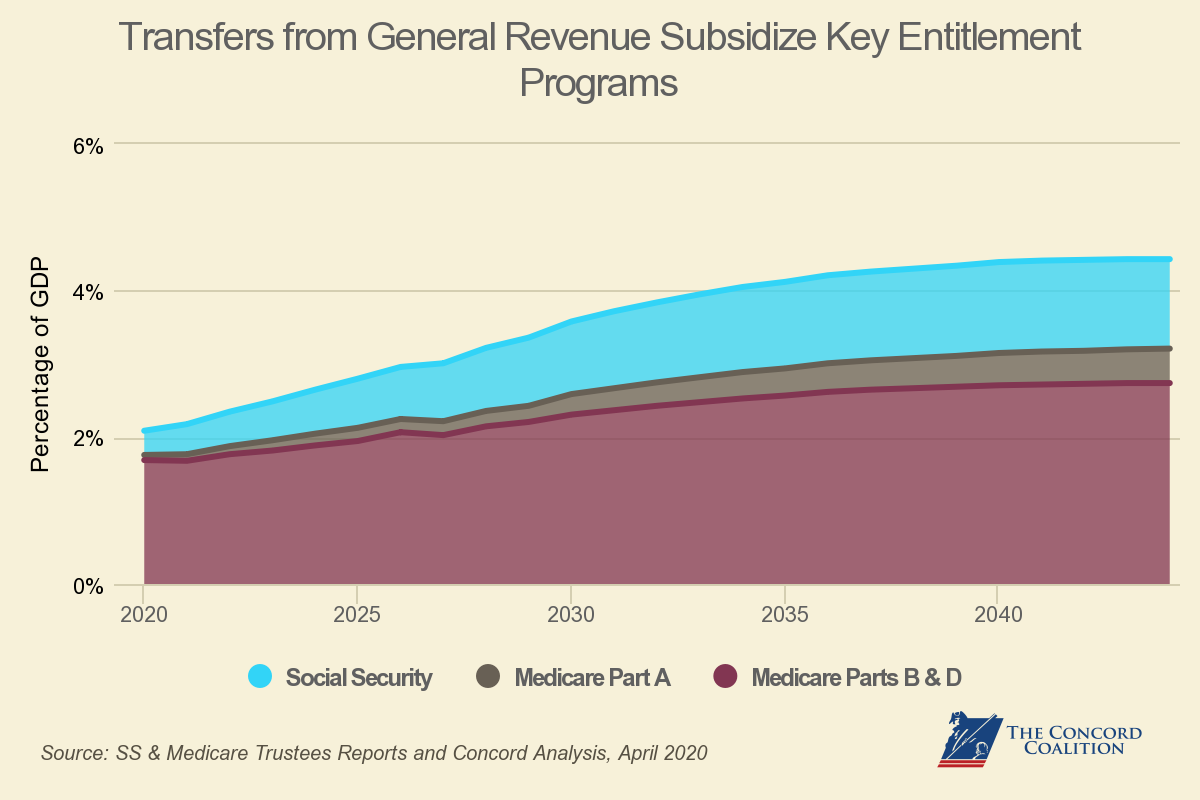WASHINGTON — While the nation’s attention is justifiably focused on containing the spread of COVID-19 and alleviating the resulting economic damage, The Concord Coalition said today that this year’s reports from the trustees of Social Security and Medicare demonstrate serious pre-existing problems that must be dealt with to ensure a sound economic future after the nation recovers from the current crisis.
“As with so many other government, business and family budget projections, the details of this year’s trustees’ reports are subject to enormous uncertainty owing to the COVID pandemic. There is far more certainty, however, that long before the pandemic, Social Security and Medicare were not on solid financial ground. As detailed in the reports, both programs contribute to steadily rising budget deficits while at the same time neither program can pay the full amount of promised benefits under current law. Ignoring the warnings in these reports will leave the public unprepared for changes that must inevitably be made to make these vital programs sustainable,” said Robert L. Bixby, Concord’s executive director.
“The trustees’ warnings are all the more alarming because the nation is not in a position of current or projected fiscal strength. Sudden and substantial benefit cuts await beneficiaries in less than 15 years — well within the lifetimes of many current beneficiaries — if lawmakers fail to act. Solutions must be found that are fiscally and generationally responsible,” Bixby added.
A particularly alarming aspect of the trustees’ report is that the actuarial deficit in the Social Security retirement program increased nearly 18 percent since last year’s report — a startling illustration of the growing chasm between projected revenues and benefit promises.
To illustrate the starkness of this challenge, the actuarial deficit reveals one of three things must happen to keep the retirement program solvent over the next 75 years: (1) dedicated revenues would have to increase by an amount equal to an immediate and permanent payroll tax increase of 3.14 percentage points — from 12.4 percent to 15.54 percent, an immediate 25 percent increase; (2) scheduled benefits would have to be reduced, for all current and future beneficiaries, by an amount equivalent to an immediate and permanent reduction of approximately 19 percent, or (3) a combination of the two.
The trustees attribute the substantial one-year increase to several factors. Chief among them are changes in economic assumptions of inflation, unemployment, real wages and interest rates which explain approximately one-third of the increase. Still, two other changes stand out:
- Repeal of the “Cadillac tax.” Last year’s omnibus appropriation bill included a provision that permanently repealed the excise tax on high-cost, employer-sponsored group health plans previously adopted as a pay-for for Obamacare. The result is a reduction in future taxable income and lower payroll tax collections. This change, in combination with the negligible effects of two regulatory changes contributed 0.12 points to the increase in the actuarial deficit, or nearly 26 percent.
-
A decline in the steady state fertility rate. Fertility rates in the US have been in steady decline since 2007 reaching historic lows in 2018 and 2019. It is not known whether this trend is permanent or merely a delay in childbearing by younger women, but the sustained decline caused the trustees’ to reduce their steady-state fertility rate from 2.0 to 1.95 births per woman. This change contributed 0.11 points to the increase in the actuarial deficit, or 23 percent.
Combined, these two changes alone account for almost half of the increase in the actuarial deficit.
It is important to remember that neither of these important programs “pay for themselves.”
The trustees’ reports confirm that Social Security and Medicare Part A (Hospital Insurance) will experience growing cash deficits in the future as they pay out more than they receive from their respective payroll taxes.
General federal revenues also support Medicare Part B, which provides various medical services, and Part D, which helps pay for medicine. By design, the premiums that older Americans pay for these parts of Medicare only cover about 25 percent of their costs.
According to the trustees, the general revenue subsidies for Social Security and Medicare are projected to total $465 billion this year, or 2.1 percent of GDP. This consists of $73 billion for Social Security and $392 billion for Medicare. If full benefits were maintained in both programs, by 2044 the subsidies would more than double to 4.4 percent of GDP.

Key drivers of these rising costs are the large numbers of retiring baby boomers and growing health care costs. This means the government must spend more each year just to provide the same level of entitlement benefits to more people.
The trustees’ projections on how long the Medicare and Social Security trust funds will remain solvent receive considerable attention each year. Today’s reports say the combined Social Security trust funds will be exhausted in 2035. Medicare’s Hospital Insurance trust fund is expected to run dry in 2026. Both reflect no change from last year’s estimate.
These trust funds, however, are not the pots of ready cash that many people believe them to be. They are merely internal government accounting mechanisms that do not provide meaningful information about the fiscal and economic effects of these programs as their growth puts more pressure each year on the overall federal budget.
The Concord Coalition also notes that for the fifth year in a row, the public trustee positions have been left vacant. This is a very serious omission, particularly in these times of great uncertainty when projections and methodologies will be subject to great scrutiny.
The public trustees play a vital role in ensuring objective oversight of Social Security and Medicare finances. The two public trustees are the only trustees who are not members of the president’s administration, and by law one must be a member of the opposing party. Concord urges the president and Congress to agree on two credible candidates to fill these crucial positions in time for them to have a meaningful role in preparing future reports.




